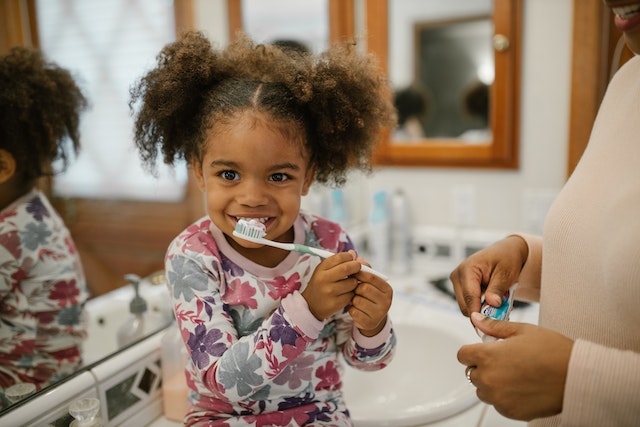A child’s teeth healthy plays a significant role in their overall well-being, from promoting a strong immune system to boosting self-esteem. However, maintaining your child’s teeth healthy can be challenging, particularly during their formative years when they are still learning the importance of good oral hygiene practices.
This comprehensive guide intends to empower parents like you with the knowledge and strategies necessary to maintain their child’s teeth healthy. With this information, you’ll be able to instill healthy habits in your child, setting them up for a lifetime of strong, radiant smiles.
For more help on managing dental anxiety in children, please see the helpful infographic below.
Provided by Cosmedent – dental continuing education
Establishing a Daily Oral Care Routine:
Instilling proper oral hygiene practices in your child at a young age is essential for preserving their dental health. The American Dental Association suggests that children brush their teeth two times a day for at least two minutes with fluoride-containing toothpaste.
Supervise your kid’s brushing until they are at least six years old to ensure they use the correct brushing technique. Additionally, flossing should be introduced when their teeth begin to touch, typically between the ages of 2 and 3.
Finding the Right Pediatric Dentist:
Pediatric dentistry in Los Angeles is thriving as parents understand the importance of maintaining their children’s dental health. With a population of over 4 million, LA is home to numerous young families seeking quality dental care for their little ones.
In fact, the city has over 4000 licensed dentists, further emphasizing the demand for dental services in the area. As a parent in LA, finding a pediatric dentist who provides a comprehensive range of services, prioritizes patient comfort, and caters to your child’s unique dental needs is essential.
LA-coms is one such renowned practice in Los Angeles. It focuses on pediatric dentistry and orthodontics. Their experienced team is dedicated to offering exceptional dental care for children and adolescents in a welcoming and comfortable environment. Their services include preventive care, dental cleanings, and treatments for common dental issues like cavities and gum disease.
Moreover, they provide orthodontic services, such as braces and Invisalign, to correct misaligned teeth and improve your child’s smile.
Recognizing Common Dental Issues in Children:
Identifying common dental issues in children is crucial for early intervention and treatment. Some typical problems include:
1. Tooth decay: 42% of children aged 2-11 have had their primary teeth affected by dental caries. And tooth decay is the most common chronic disease in children aged 6-19, according to the CDC. Encourage healthy eating habits and regular dental checkups to prevent tooth decay.
2. Gum disease: Gums that are red, swollen, or bleed may indicate gum disease. Teach your child the correct brushing and flossing techniques to maintain healthy gums.
3. Dental injuries: Physically active children commonly suffer from chipped, cracked, or knocked-out teeth. Encourage the use of mouthguards to protect their teeth during sports and other activities.
Regular Dental Checkups and Cleanings:
Regular dental checkups, as well as cleanings, are essential for your child’s teeth healthy. The American Academy of Pediatric Dentistry (AAP) recommends scheduling a six-month dental appointment for your child right when their first tooth erupts or by their first birthday.
These appointments enable your dentist to detect and treat potential dental issues early, thereby preventing the progression to more serious complications.
Promoting a Healthy Diet for Strong Teeth:
US children consume an average of 143.2 pounds of added sugar annually, the leading sources being sweet snacks, desserts, and sugar-sweetened beverages. The Department of Health and Human Services-US recommends reducing sugar intake for people aged two years and older.
A balanced diet is essential for the dental health of your child. Sugary and starchy foods contribute to tooth decay, whereas calcium-rich foods such as milk, cheese, and yogurt strengthen tooth enamel. In this way, they provide a defense against acid-causing bacteria.
Encourage your child to consume different fruits, vegetables, lean proteins, and dairy products. Refer to Dietary Guidelines for Americans 2020-2025 for further information.
Educating Your Child about Dental Health:
Educating your child about dental health is key to instilling good oral hygiene habits that will stick with them even into adulthood. Make learning fun and interactive by incorporating age-appropriate activities like reading books, watching videos, or using smartphone apps that teach kids about dental care.
Encourage open conversations about dental health and answer any questions they may have. By fostering a positive attitude towards oral care, you’ll help your child develop a lifelong commitment to maintaining healthy teeth and gums.
Managing Dental Anxiety in Children:
Dental anxiety is common among children and can make dental visits quite challenging. To help your child feel more at ease, consider the following tips:
- Select a reputable pediatric dentist with a friendly, calming demeanor.
- Before their first appointment, introduce your child to the dental office and its staff in order to instill comfort and trust.
- When discussing dental visits, use positive language and avoid sharing any negative personal experiences.
- Encourage your child to express their feelings and concerns about dental appointments and respond with understanding and reassurance.
The Impact of Fluoride on Child’s Teeth Healthy:
Fluoride is a naturally present mineral that strengthens tooth enamel and thus helps prevent tooth decay. According to research, children with access to fluoridated water have significantly fewer cavities than those without. According to a study, children living in communities with fluoridated water experienced a 25% reduction in tooth decay.
It’s essential to ensure your child receives an appropriate amount of fluoride, either through drinking water or fluoride supplements prescribed by a dentist or pediatrician.
Sealants as a Preventive Measure for Cavities:
Dental sealants are a protective layer or coating applied to the masticatory surfaces of molars to prevent cavities. The CDC states that children with dental sealants have three times fewer cavities than those without sealants. Consult your pediatric dentist about whether dental sealants are appropriate for your child, as they can be an effective precautionary measure, particularly for children who are predisposed to cavities.
The Role of Regular Dental X-Rays:
Dental X-rays are an important tool for detecting potential dental problems that might not be visible during a routine checkup. The American Academy of Pediatric Dentistry recommends dental X-rays for children at least every 12 to 24 months, depending on their individual risk factors. Regular X-rays can aid in the early detection of problems such as tooth decay, impacted teeth, and jawbone abnormalities, allowing for timely intervention and treatment.
The Connection between Oral and Overall Health in Children:
Oral health is closely linked to overall health, and poor dental hygiene can lead to a host of health problems. A study found that children with poor oral health were nearly three times more likely to miss school due to dental pain.
Additionally, the American Academy of Pediatrics identifies the key risk factors responsible for tooth decay in children that can lead to infections, speech problems, and malnutrition. In short, compromised oral health means compromised overall well-being.
Conclusion:
Caring for your child’s teeth healthy is an ongoing commitment that requires knowledge, commitment, persistence, patience, and a proactive approach. Fostering a positive and constructive attitude towards dental care will help your child embrace the importance of maintaining healthy teeth and gums.
As a parent, your unwavering support and guidance in your child’s teeth healthy journey are invaluable, significantly contributing to their overall happiness and sense of well-being.










